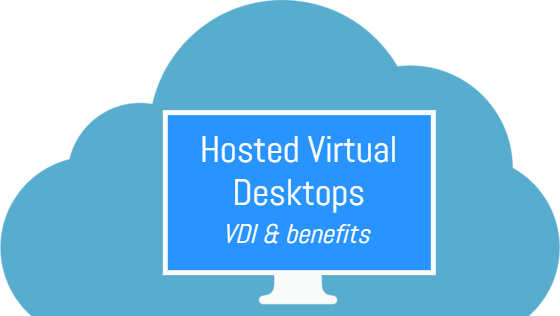Why hosted virtual desktops?
More and more companies adopt virtual desktop solutions. This is a great way to achieve better network control and to improve your company-wide performance.
As you probably know, with virtual desktop infrastructure, each individual user’s desktop environment is hosted by a remote-access server and not stored on the employee’s local machine. This enables organization-wide access to higher computing power with a centralized approach, and it allows employees to bring their own devices saving the company’s resources.
Instant backup capabilities
In general, employees work on machines with all software stored on the hard drive, locally on that same machine and possibly also on a server within the local network. This traditional solution often left applications and files on those machines exposed to potential threats – they could be misplaced, stolen or experience hard drive failure.
VDI eliminates dependence on the local machine for storage or computing power. The user’s experience remains the same, but all the core software, applications, and files are stored on remote servers instead of individual hard disks.
This shift makes backup and restoration a painless process and reduces the chance of failure that could lead to data loss. And because each virtual machine works as an individual on the server, even if one of these virtual machines goes down, the others are not affected.
Cost efficiency
Purchasing and maintaining their hardware rank among the highest IT expenditures most companies make.
VDI uses data center’s computing power and storage capabilities, so all individual machines within your local area network (LAN) will require less RAM, HDD space and overall computing power to function efficiently. This means your company can invest in more affordable machines basically without sacrificing performance. This obviously prolongs the life of otherwise quickly outdated hardware, allowing your organization to capitalize more on the initial hardware investments.
By using VDI you will be able to avoid costly capital expenditures such as top-notch servers, relying instead on a professionally managed remote data center to provide this resource for your organization. This way you can reallocate the budget to other vital areas of your business.
A virtual desktop infrastructure will reduce costs associated with equipment maintenance. Also, patches, upgrades, and updates can be made to your company’s unique centralized hard drive image and then easily pushed out to the entire network, rather than patching or updating each individual machine one by one. This will save time and headaches.
Multiple layers of security
Like many other benefits of VDI, improved security is the result of centralization. By storing all sensitive data and files in one central location where access is password-protected, your data will be secure and automatically protected from loss.
If an employee loses his/her smart device, and if your organization already requires machines to be password-protected and has login/logout policies in place, VDI will use multiple layers of security to monitor and protect your data from potential hackers.
Simplified management
We’ve pointed out several benefits associated with VDI’s centralization, but there isn’t one more important than the simplified management VDI provides. VDI allows you to perform updates, backups, virus scans and other maintenance tasks far easier.
This centralized management is also an advantage in growing and scaling. VDI means hardware is virtualized, so as you hire employees, your IT provider can deploy the base image of what their desktop should look like and then credential them into that image. All employees will get access to the network’s computing power and virtualization will replicate the traditional local area network (LAN) connection where all machines are connected and able to communicate with each other.
Reduced lag time
With virtualization, all the “heavy lifting” associated with computing is transferred to powerful remote servers where software and data are centralized. This means that all applications will perform faster due to increased computing power.
So, reduced latency, increased computing power and downtime reduction VDI ensures for disaster recovery will generate massive savings over time.
Is VDI right for my small business?
Every organization has its own operational needs. Still, almost all organizations can benefit from the centralized control over their data, security, and performance that a virtual desktop infrastructure provides.
Eventually, most small businesses will use VDI to save man-hours on administrative activities and maintenance costs to further improve their IT approach.




I really like it! Thanks.